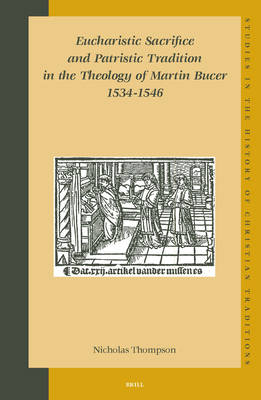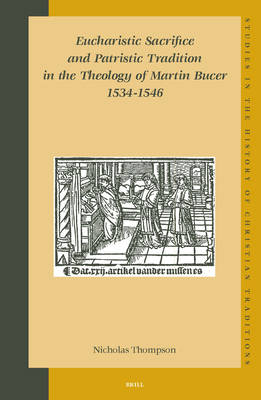
- Afhalen na 1 uur in een winkel met voorraad
- Gratis thuislevering in België vanaf € 30
- Ruim aanbod met 7 miljoen producten
- Afhalen na 1 uur in een winkel met voorraad
- Gratis thuislevering in België vanaf € 30
- Ruim aanbod met 7 miljoen producten
Zoeken
Eucharistic Sacrifice and Patristic Tradition in the Theology of Martin Bucer, 1534-1546
Nicholas Thompson
€ 236,95
+ 473 punten
Omschrijving
Luther described the Mass as the "greatest and most horrible abomination" of the papal church. On this, he argued, nothing could be surrendered. However, during the 1530s and early 1540s, the Strasbourg reformer Martin Bucer (1491-1551) sought rapprochement with the Catholics on precisely this matter.
This book looks at Bucer's overtures to Catholic moderates in the era of the religious colloquies. He proposed to circumvent the Reformation impasse by returning to the Eucharistic theology of the church fathers and early scholastics. These efforts culminated in the Eucharistic articles of the Worms-Regensburg Book (1541). Bucer's falling out with the same Catholics in aftermath of the Colloquy of Regensburg reveals the extent to which the agreed articles were based on misunderstanding - as well as the considerable common ground that continued to exist between them.
In its examination of this most fraught of Reformation debates, the book also sheds light on Bucer's ecumenical theology and his aspirations for a reunion of the German and European churches.
This book looks at Bucer's overtures to Catholic moderates in the era of the religious colloquies. He proposed to circumvent the Reformation impasse by returning to the Eucharistic theology of the church fathers and early scholastics. These efforts culminated in the Eucharistic articles of the Worms-Regensburg Book (1541). Bucer's falling out with the same Catholics in aftermath of the Colloquy of Regensburg reveals the extent to which the agreed articles were based on misunderstanding - as well as the considerable common ground that continued to exist between them.
In its examination of this most fraught of Reformation debates, the book also sheds light on Bucer's ecumenical theology and his aspirations for a reunion of the German and European churches.
Specificaties
Betrokkenen
- Auteur(s):
- Uitgeverij:
Inhoud
- Aantal bladzijden:
- 320
- Taal:
- Engels
- Reeks:
- Reeksnummer:
- nr. 119
Eigenschappen
- Productcode (EAN):
- 9789004141384
- Verschijningsdatum:
- 23/11/2004
- Uitvoering:
- Hardcover
- Formaat:
- Genaaid
- Afmetingen:
- 167 mm x 245 mm
- Gewicht:
- 739 g

Alleen bij Standaard Boekhandel
+ 473 punten op je klantenkaart van Standaard Boekhandel
Beoordelingen
We publiceren alleen reviews die voldoen aan de voorwaarden voor reviews. Bekijk onze voorwaarden voor reviews.











